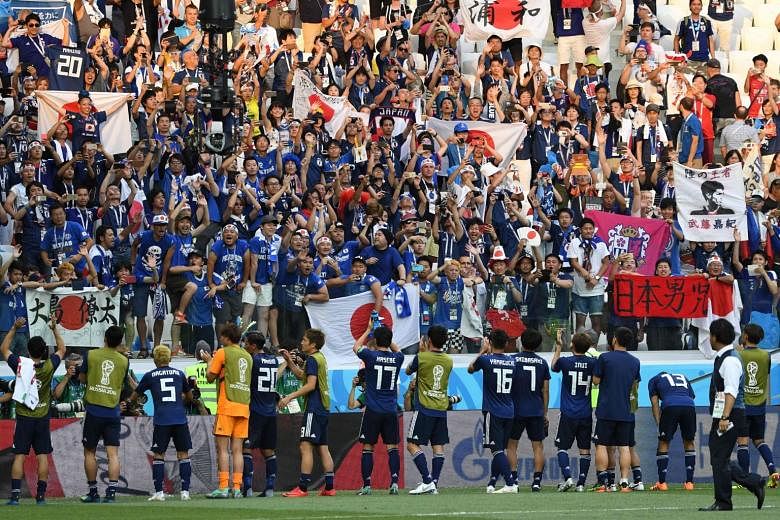KALININGRAD - With just 13 wins in 96 games, it is not wrong to say that Asian teams have been making up the numbers at the World Cup.
That all changed at Russia 2018 after all four Asian (geographical) representatives - Japan, Iran, South Korea and Saudi Arabia - won one game each, the first time this has happened since more than one Asian country qualified at the 1986 tournament.
A common thread is that the quartet appears to have shed their inferiority complex against traditional powerhouses, despite the seeding format being changed to one based on rankings, exponentially increasing their likelihood of being grouped with the big guns.
The pick of the bunch has to be the Samurai Blue, whom most had written off after they sacked coach Vahid Halilhodzic just two months before the tournament.
But they have been vindicated in their decision to replace the Bosnian with Akira Nishino, the man who engineered the Miracle of Miami at the 1996 Olympics. There, Japan shocked a Brazil side featuring World Cup winners Bebeto, Rivaldo and Ronaldo - the eventual bronze medallists - 1-0 in the group stage.
Against all odds in Russia, Japan stunned 10-man Colombia 2-1 in their Group H opener to become the first Asian team to beat a South American side at the Finals.
They then drew 2-2 with Senegal and, despite losing 1-0 to Poland on Thursday (June 28), qualified for the round of 16 by virtue of having a better fair-play record than the Africans.
Communication is key and Nishino definitely understands the finer details of the Japanese culture more than the austere Halilhodzic.
Dubbed "Old Man Japan" with an average age of 28.3, and seven players over 30, this is the oldest team they have ever fielded at the World Cup, which suggests they found it tough to learn the "more aggressive, street-smart and vicious" new tricks that Halilhodzic was trying to impart to this team.
Instead, Nishino guided them back to playing a more familiar brand of quick, passing football to get past more physically imposing opponents as they dominated possession - 59 per cent against Colombia and 54 per cent against both Senegal and Poland.
With the shackles off, the Japanese look a happier bunch and have found their fighting spirit, finding the winner after Colombia had equalised, coming back twice for a point against Senegal, before just about getting the job done against Poland.
While the four-time Asian champions turned to a local coach to get back on track, exporting their best players to stronger foreign leagues also helped them to improve mentally, technically and tactically.
Only eight out of their 23-man squad play in the J-League, and their four scorers in Russia ply their trade in Germany, Spain and Mexico.
P.N. Sivaji, former national coach and Football Association of Singapore technical director and now technical director of Myanmar National League side Hanthawaddy United, told The Straits Times: "There is an obvious closing of the gap and I think from here, Asian teams will go even further.
"If you look at the likes of Japan and Korea, their players have a very strong mentality.
"It is also clear that Asia teams are playing with more confidence, and it is perhaps because their players are now in some of the best leagues, facing some of the best players in the world."
It could be argued that Japan took full advantage of a negotiable group but, while Saudi Arabia, Iran and South Korea failed to advance, they left Russia with their heads held high.
The Saudis, who had three coaches in three months, showed resilience to bounce back from a 5-0 spanking by hosts Russia to restrict two-time world champions Uruguay to just a 1-0 win, before coming from behind to down Egypt 2-1 in the Group A dead rubber.
On the other hand, Iran enjoyed much more backroom continuity with Carlos Queiroz at the helm since 2011. He has instilled defensive stability, which showed even in a tough Group B, as 2010 winners Spain and European champions Portugal each managed to score just once against them.
Emerging from international isolation to play more friendlies also helped the likes of Alireza Jahanbakhsh, Reza Ghoochannejhad, Sardar Azmoun and Karim Ansarifard be more assured in attack.
Iran confidently took the game to their rivals and were unlucky to be denied an equaliser against Spain for offside, before a gritty 1-1 draw with Portugal, which they could have even won to send Cristiano Ronaldo's side packing had Mehdi Taremi found the net deep into added time.
But by far the biggest shock of the tournament so far belonged to South Korea, who dragged Germany out of the competition along with them by beating the defending champions 2-0.
Like Japan, the Taeguk Warriors went for a local coach to succeed Uli Stielike and Shin Tae-yong showed his tactical acumen by plumping for third-choice goalkeeper Jo Hyeon-woo due to his stronger handling of high balls.
Jo repaid the faith with 13 saves, including six against Germany, and numerous interceptions to thwart the other Group F opponents Sweden and Mexico, who both beat the Koreans with the help of a penalty.
South Korea's late and successful push for a winner also indicates Asian teams' mentality change from making up the numbers to making an impact.
Vincent Subramaniam, an FAS coaching instructor and Asian Football Confederation (AFC) technical consultant, said the efforts of the regional body played a part in Asia's improved showings in Russia.
He told ST: "The AFC management reviewed the performance of Asian teams at the 2014 World Cup in Brazil and, following that report, there was special emphasis put on coaching education.
"In 2015, former Scotland manager Andy Roxburgh was brought in to improve the level of coaching by moving the AFC coaching licence to more in line with the levels at Uefa.
"Even now, the AFC has technical staff studying Asian teams at the World Cup, with a view to implementing programmes to help Asian teams improve further."
It remains to be seen how far Japan can go in Russia but, in the next four years, Qatar and Asia's finest will do well to learn from this edition and improve for 2022. •Additional reporting by Shamir Osman


